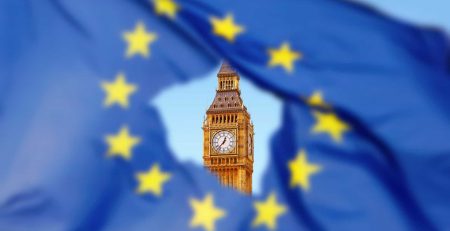Brexit, The Broken Link and Parliamentary Sovereignty
In the last three years, we have witnessed how the process leading up to Brexit was accompanied by several developments of the British political system, leading to continued failures in the approval of the withdrawal agreement and delays to the United Kingdom’s exit from the European Union.
If we go back further in time, we recall that, straight after the 2014 EU Parliament elections, upon entering the informal session of the European Council which would analyze the results and choose the new President of the EU, David Cameron would declare:
We need an approach that recognises that Brussels has got too big, too bossy, too interfering. We need more for nation states, […] It should be nation states wherever possible and Europe only where necessary.
And that whoever who lead the EU would have to simply accept that.
It is not out of the ordinary for a British prime minister to reaffirm the traditional British skepticism regarding an ‘even closer Union’ but Cameron was at the time pressured by particular circumstances. One year away from legislative elections, Cameron led a coalition government where his party did not have the majority of the seats in the Parliament (something rare in Westminster) and had just witnessed UKIP’s victory in the elections to the European Parliament with 27% of the votes, sending the Conservative Party to a modest third place.
Moreover, those declarations were aimed above all at the choice of Jean-Claude Juncker as President of the European Commission, chosen through the method of the Spitzenkandidat. In the end, the UK would vote against that nomination (with another vote from Hungary), in one of the few times that the European Council would have had to formally vote on the nomination, instead of the traditional informal consensus.
This event would later lead a cabinet member of Cameron’s government to declare that the Spitzenkandidat method, which the UK had tried to stop through all available diplomatic channels, had had a great influence in the events leading up to Brexit[i].
The promise to hold a referendum on the UK remaining in the EU was old and had been key to the rise of David Cameron as leader of the Conservative Party but had been hindered by the need to establish a coalition with the Liberal Democrats in 2011. Cameron reaffirmed it in his electoral manifesto to the 2015 elections saying that the EU needed to change and that it was time for the British people – not politicians – to have their say. He claimed that only the Conservative Party would deliver real change and real choice on Europe, with an in-out referendum by the end of 2017[ii]
The time for the British People
The conservatives won the 2015 May elections with an absolute majority. In November of 2015, in a letter addressed to the President of the European Council, Donald Tusk, the British PM initiated the negotiation process with the remaining member states towards reform in several areas, among which immigration, ensuring that it would be absolutely clear, ‘in a formal, legally binding and irreversible way’, that the UK would not have to contribute to an even closer Union. In February of 2016 an agreement was reached, and Cameron summoned a referendum to be held on the 23rd of June, in which he would defend the UK to remain in the EU.
Referenda are instruments of direct democracy which, paradoxically and in theory, are not typical of democracies such as the one in Westminster, as Arend Lijphart[iii] explains. However, if we look at recent history, we notice that holding a referendum in the UK is not something unheard of. Nevertheless, from the 12 referenda held since the 1970’s only three (European Community 1975; Electoral System 2011; remaining in the EU 2016) had general character, the other nine concerned specific parts of the country and the relations between the central government of the UK and the different parts of the kingdom (Northern Ireland, Wales, Scotland).
The night of the 23th of June 2016 was long and the dawn brought a surprising result for most observers. With a high participation rate of over 30 million constituents (72%), a majority of 52% would choose to leave the EU, beating by a small margin the remainders. Defeated in his promises to the British people and European partners, David Cameron left the scene, leaving behind all the problems.
It became clear from a very early hour that a merely binary choice, especially one taken with such small margin, did not contain the answers to some of the very pressing questions. When and how would the UK leave the EU? In what terms would the future relation be? How would that referendum affect the relationship with Scotland, which in 2014 had voted to remain in the UK but whose vote to remain in the EU had been a significant 62%?
The exit of the UK from the EU is as relevant as legitimate and complex. It is not just a question of a positive or negative answer, but it’s about a set of indissociable questions, interdependent, with substantive basis. To place a decision of such nature in a binary method, non-continuous and largely majoritarian, is to forget the complexity of what needs to be discussed and agreed upon. The problem, or the argument, is not that the constituents would be less qualified to make that choice than their representatives. As one could witness during the process in the Parliament, the challenge is to answer questions which require extensive debate and the search for common ground.
People v. Parliament or Government v. Parliament
In the day following the referendum, one of the first questions which arose was to know who could and how could the article 50.º of the Lisbon Treaty be activated, meaning, the formal request of the UK to leave the Union. Would there be any automatic procedure between the popular vote and the exit of the UK from the European Union? Would the result suffice so that the British Government, now led by Theresa May, simply notified the European Council of its actions, or should the British Parliament still have something to say?
On the 3rd of November 2016 the decision of the High Court was turned public: according to the constitutional principle of parliamentary sovereignty, the Government could not alone activate the article 50.º and the approval of the British Parliament was required:
It is common ground that the most fundamental rule of UK constitutional law is that the Crown in Parliament is sovereign and that legislation enacted by the Crown with the consent of both Houses of Parliament is supreme
This legal reasoning would be then confirmed by the Supreme Court on the 24th of January.
Regarding the fact that the UK does not have a written constitution, whereby the rules concerning organization of the political powers of political institutions as well as the sovereign power of the Parliament to amend those laws, the great scholar of French political systems Maurice Duverger use to recall, with wit: «In this sense, some say that the British Parliament can do ‘everything, apart from changing a man to a woman”[i].
On the 29th of March 2017, the House of Commons approved a law that conferred upon the PM the power to notify the European Council of the request to leave, thus starting the procedure that should have led to the formal exit by the 29th March 2019. However, as we are all aware, this was not the case. After having rejected the withdrawal agreement twice, on the 26 of March 2019, the Parliament approved an amendment to retake control over the Brexit agenda and, in a series of votes, it rejected the withdraw agreement and once again delayed the exit date. Facing the continuous disapproval by the Parliament, both the UK and the EU agreed on an extension of the period until 31st October 2019. However, exhausted after three rejections of her deal, Theresa May would resign and abandon the leadership of the Conservative Party and the Government in July 2019.
What seemed initially to be above all a dispute between the legitimacy of an instrument of direct democracy and another of representative democracy, quickly turned into a dispute between the executive and the legislative branches of power.
Elections, an exit to the exit?
Boris Johnson, a Brexit supporter from day one, took the leadership of the Government committed to establishing a new deal and to comply with the final deadline of the 31st of October to get Brexit done. However, Johnson, just like May, did not possess the same power as others had in the past. As Walter Bagehot superbly synthetized in 1867[ii], the Cabinet system of government is characterized by the fusion between the legislative and executive powers, hence giving a great deal of power to the PM who controls the majority in the Parliament.
What happened during this process was that neither Theresa May nor Boris Johnsons ever enjoyed the control of such majority, because the Conservative Party has been divided with frequent ‘rebellions’, from both Members of Parliament who defend a hard Brexit and of those who opposed Brexit. That is why Theresa May attempted to increase the Conservative’s majority in 2017 with early elections. Those elections would end up having the opposite result, and the Conservative Party would lose its absolute majority in the House of Commons. With those internal divisions and without an absolute majority, there was no longer a link between the executive and legislative powers which could have enabled the PM to control the process.
It was in this context that Boris Johnson failed to fulfil the promise of delivering Brexit before the deadline of the 31st of October. He now has but one remaining option to be able to deliver Brexit. Although the Fixed-term Parliaments Act of 2011[iii] made it much more difficult for a PM to call early elections, the Parliament agreed to call early elections, which will be held on the 12th December 2019, at the same time as it failed to approve Johnson’s withdrawal agreement. We will see if these elections will finally allow the PM to take back control of the legislative power in the House of Commons.
Paradoxically, it is in the restauration of the link between the executive and legislative powers that lies the definitive separation of the UK from the EU. However, this lengthy procedure has already taught us that anything concerning Brexit that is subject to approval, be it a referendum, be it the precise terms and conditions of the future relation with the EU, the Parliament will have to be heard. In the evolution of the customary system that characterizes the British system of government, the power passed from the Crown to the Parliament, then from the Parliament to the Cabinet and from there to the PM. But the old British parliamentary sovereignty will always have the last word.












